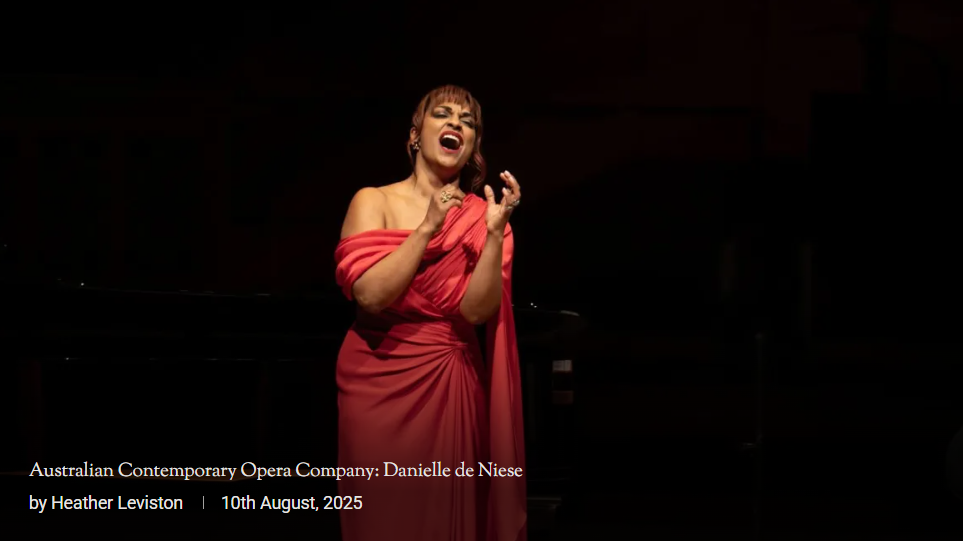
by Patricia Maunder on 10 August, 2025
Described as “opera’s coolest soprano” by The New York Times Magazine, Danielle de Niese sings very little opera at her one-off Melbourne concert.
Instead, this star of top houses from The Met to Convent Garden delivers a program that reveals the remarkable diversity of her talents and career.
The concert is also something of a showcase for Melbourne’s Australian Contemporary Opera Company, for whom de Niese is the International Ambassador. Several of the company’s Rising Artists make notable contributions.
Joining the singers on Melbourne Recital Centre’s main stage are seven exceptional musicians performing in various configurations, as well as charmingly down-to-earth MC, comedian Annie Louey.

With renowned stage presence and Emmy-winning TV chops, de Niese is ever-ready with a microphone too. She begins the concert with an anecdote about opera legend Renée Fleming choosing her for a principal role in the 2015 premiere of Jimmy Lopez’s Bel Canto.
De Niese sings You were destined to come here from that opera based on Ann Patchett’s novel, effortlessly filling the room with a strong, supple voice enhanced by beautiful colour and phrasing.
Next is the prologue from Kurt Weill’s Seven Deadly Sins, in beguiling English, and two works from the song cycle James Macmillan is currently writing for de Niese. Always an expressive singer, she is particularly so in what are just some of the Australian premieres presented during this two-hour concert.
Most unexpected among them are two rarities of the Baroque period (one of de Niese’s many fortes), starting with Gia nel seno from Handel’s Lucrezia cantata – a little feast of gorgeously rounded notes.
Petrarch’s sonnet Pace non trovo, set to a movement of Alessandro Marcello’s oboe concerto, is a sublime duet between de Niese and oboist Rachel Curkpatrick. As is apparent throughout the concert, the soprano ensures her collaborator shares equally in the audience’s appreciation.
Jumping back to the 21st century, de Niese then reprises the song she performed at a NASA event, composed by Christopher Tin for the occasion with lyrics drawn from an Amelia Earhart poem. She makes this musical theatre-style number soar.

After some Rising Artists step into the spotlight (more on them later), the headliner returns with an evocative Italian aria composed by Patrick Cassidy for the 2001 film Hannibal, which de Niese first performed on screen. Those CV surprises just kept coming.
After interval, having switched from an elegant candy-red gown that both clung to and draped over her body, to a figure-hugging iridescent-black halter-neck, De Niese delivers a short second set.
Mostly a parade of classic show tunes, accompanied with alacrity by pianist Coady Green, it begins with Gershwin’s Let’s call the whole thing off. While her vocal technique and theatricality can’t be faulted, the somewhat operatic interpretation lacks the playfulness it needs to really work. A minor quibble.
Gershwin’s I’ve got rhythm and Bernstein’s A little bit in love are effervescently good, and de Niese delivers Kern’s Can’t help loving that man of mine with wonderful heart.
This set also includes two modern works that again show why this diva has always been in demand: John Denver’s Rhymes and Reasons, with which she made her LA Opera debut aged 15, and Hal Cazalet’s uplifting Song for Nature, which de Niese premiered in 2021 at the London Climate Change Festival.
Not including the two encores (Gershwin’s jaunty By Strauss among them), the concert ends with Leonard Cohen’s Hallelujah – a highlight of the evening. Accompanied by harpist Marshall McGuire, de Niese embellishes the Rising Artists’ ethereal harmonies.
The young singers who stepped into the spotlight earlier prove worthy of their place in this significant occasion for the Australian Contemporary Opera Company.
Singing Where from Kate Miller-Heidke’s The Rabbits, soprano Sophie Bisset delivers the difficult rising top notes with ringing clarity – especially impressive given this marks her professional debut.
Nicely supported by soprano Uma Dobia, Callum Warrender reveals a powerful, burnished tenor with Shhh … See. They see me from Jonathan Dove’s The Enchanted Pig.
The lack of stylistic cohesion arguably makes this concert less satisfactory that it could have been. Some may also be disappointed that this rare ‘hometown’ performance by Melbourne-born de Niese doesn’t include more of the art form she’s internationally famous for. (Hang in there for her Opera Australia’s Carmen in November, following the current Sydney season.)
And yet the audience is, unsurprisingly, very appreciative of this homecoming of sorts, which showcases de Niese’s extraordinary voice, range and charisma. As the audience member sitting next to me observes, she could make singing the phonebook sound good.

Leave a Reply